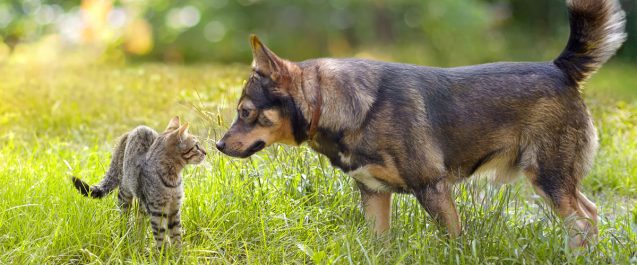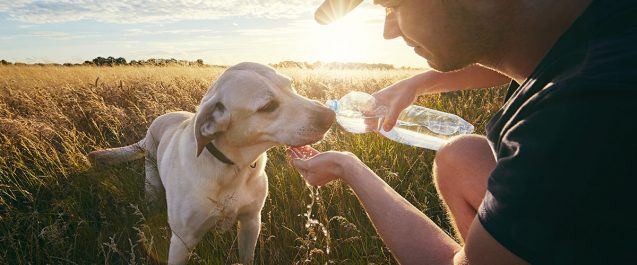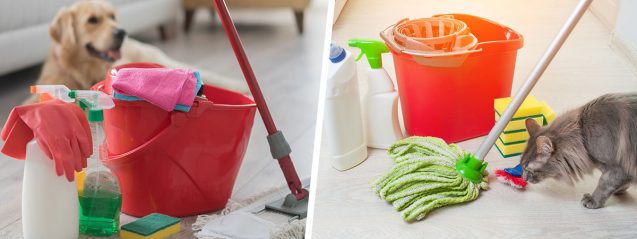Read on to find out how some common health issues can be prevented with the right knowledge and advice. The old saying is certainly true- “Prevention is better than a cure”.
Vaccinations are a vital factor in keeping your pet happy, and healthy, and safe from potentially life-threatening diseases.
Here are the most common vaccinations you will need to make sure your pet is up to date with:
Cats
We recommend that cats be vaccinated with at least an annual ‘F3’ vaccination.
This protects them against:
- Feline herpes virus– which causes sneezing and a runny nose.
- Feline calicivirus– which causes difficulty breathing, runny eyes and nose, and can develop into pneumonia.
- Feline panleukopaenia– which causes vomiting and diarrhoea.
Dogs
We recommend that dogs be vaccinated against the following:
- Distemper– a highly contagious viral disease which is often fatal. It can be spread via nose-to-nose contact with infected animals or sniffing urine, vomit, or faeces from an infected animal.
- Hepatitis –which causes inflammation of the liver. This disease is more extensive than affecting just this organ. Initially, the dog develops a fever, then the virus spreads to the lymphatic system and damages the liver and kidneys.
- Parvovirus– a viral disease that affects the gastrointestinal tract, bone marrow, and lymphatic systems. The condition is contracted by contact with the saliva, vomit, or faeces of an infected animal or by direct contact with an infected animal.
- Canine Cough (which is also known as Kennel Cough) – There is a viral and bacterial version of kennel cough. Signs include a sudden onset dry hacking cough. Affected dogs can be bright and active, but the cough worsens with activity.
All the diseases above are highly contagious and some potentially fatal. The good news is that you can protect your pet from these diseases by keeping their vaccinations up to date.
There is a range of vaccination types and schedules for puppies & kittens and adult dogs & cats.
We recommend that you contact us to discuss the most suitable for your furry friend.
Our vaccination appointments fill up quickly, so be sure to book well ahead of time to secure the appointment that suits you best. If you are not sure when their vaccination is due, have a chat with our friendly team.
Call us on (07) 3357 3882, email us at info@wilstonvet.com.au or book online to organise your pet’s vaccination appointment today!
More
Hot-spots are a common problem amongst dogs, and some breeds like golden retrievers, labradors, and rottweilers may be more susceptible to these than others.
What is a hot spot?
A hot-spot can otherwise be known as a ‘moist skin rash,’ acute moist dermatitis, or pyotraumatic dermatitis. It is an area of skin or lesion that looks red, inflamed, and may have matted hair on or around it, and sometimes slimy discharge. They develop very quickly and can progress within hours.
Usually, they can be found around the dogs:
What causes hot-spots?
- Flea infestation
- Ear infections
- Allergies
- Warm & humid weather
- Wet fur against the skin (for long periods – i.e. under the collar after swimming)
- Underlying medical conditions
These issues promote bacterial growth, making the area very itchy and potentially sore.
While being relatively easy to spot, your pet will likely alert you to the hot-spot with excessive scratching and licking if the area is within reach.
How are hot-spots treated?
To treat a hot-spot, we will:
- Trim the fur from around the area
- Clean the area with an antiseptic
- Use antibiotics and/or anti-inflammatory treatments
In some cases, ongoing use of antibiotics and/or anti-inflammatory treatments may be required to treat the infection and allow the skin to heal properly. Hot-spots may be sensitive or painful to treat, and we may recommend a general anaesthetic if appropriate.
Due to the fast-moving nature of these infections, we recommend you bring your dog to see us as soon as possible if you suspect a hot-spot is forming. The quicker we can treat your dog, the less chance the hot-spot has of becoming large, difficult to treat, and painful.
If you have any questions or want to make a booking, call us on (07) 3357 3882, email us info@wilstonvet.com.au, or book online today.
More
We all love spending quality time with our pets on a hot summer’s day. However, we need to stay vigilant in summer, as the warmer weather can expose our pets to several dangers.
One of these dangers is heatstroke. Heatstroke, or hyperthermia, occurs when your pet’s body temperature rises rapidly. It is a life-threatening condition that requires immediate treatment.
There are several causes for heatstroke, including:
- Being left in a hot car,
- Being left outdoors during extreme heat,
- Not having enough shade and water when outdoors,
- Exercising in hot weather.
It is important to know the signs of heatstroke – even if you avoid all the above.
Your pet may show some or all of the below symptoms:
- Excessive panting,
- Restlessness,
- Drooling excessively,
- Becoming unstable on their feet,
- Their gums turn a bluish-purple or bright red colour.
If your pet is showing any of the above symptoms, you must take them to a vet immediately.
Make sure to cool your pet while you are on your way to see us.
The most effective way to cool your pet is by using a fan or air-conditioning. You can also use a damp towel or a spray bottle filled with water to cool them lightly. It is important not to submerge your pet in ice-cold water, as this could be detrimental to their recovery.
Other warm-weather tips:
- In hot weather, it is also essential to keep your pet’s feet in mind – if the pavement is too hot for your bare feet, it is too hot for your pets! Keep them inside, walk in the shade, or use pet socks/shoes if it’s not possible to keep them off hot surfaces.
- Always ensure there are plenty of cool places with shade and fresh water for your pet to access on hot days. Never leave them unattended in a car, even if the windows are down.
- Before the weather gets too warm, book your pet in for a groom to remove any unnecessary shedding hair, and a trim where suitable. Do not shave your pet’s coat yourself – some breeds require their coats to help regulate body temperature.
- Brachycephalic dogs are more susceptible to heatstroke and can develop serious health issues quickly due to their inability to pant efficiently. If you own a brachycephalic dog (a dog with a flattened face, such as a French or English bulldog, Pug, Boston terrier, Pekinese, Boxer, etc.), please be very mindful of their whereabouts on a hot day, and keep an eye out for any of these symptoms.
If you think your pet is suffering heatstroke, or you want to know more about how to prevent it, call our team today!
More
The silly season is an exciting time of year, with Christmas and New Year’s Eve celebrations giving us plenty of reasons to let loose and celebrate. With an increase of visitors, noises, tasty treats, shiny new toys, and interesting smells, this time of year can be overwhelming for our pets.
Here are some recommendations to make sure your furry friends are safe and happy during this festive time.
- Make sure your pet has access to a quiet, calm, and secluded spot to hide away if needed
- Exercise your pets before any guests arrive or before any particularly noisy events (i.e., fireworks displays) if you can – a pet with pent up energy can easily become anxious
- Keep Christmas decorations and wrapping items (paper, tape, ribbon, discarded plastic, etc.) out of your pet’s reach. If ingested, these items can cause serious health problems, including intestinal blockages that may require surgical removal
- Many plants and flowers used for Christmas decorations are toxic to pets – be sure to keep these out of reach
- Many foods we see at celebrations are toxic to pets and can even be fatal. Make sure your pet does not have access to:
- Salty foods (chips, pretzels, crackers, etc.)
- Lollies & artificial sweeteners
- Grapes, sultanas, raisins, and currants
- Cherry pits (and other stone fruit pits)
Fireworks can be terrifying for pets. Here is a list of tips for preparing your pet for fireworks displays:
- Keep pets indoors when possible. The walls and roof will help to soften the noise and will also contain them safely.
- Prepare your pet for loud noises during the day by putting on the TV or radio. Turn the volume up progressively throughout the day, so when the fireworks display commences, the existing noise will create a distraction
- Avoid fussing over your pet. Carry on as normal, as this will reassure your pet nothing is wrong. You can use treats and games to distract them and encourage calm behaviour.
- Ensure your pet’s microchip and identification tag details are up to date. Unfortunately, many pets escape during fireworks displays and can be found very far from home.
- Pheromone diffusers could help to calm your pet. Talk to our team about Feliway for cats or Adaptil for dogs.
- Some pet owners choose to use medications to assist in keeping particularly anxious pets calm. This is not something our team can organise for you without prior consultation, so please book in advance.
Our appointments during the festive season fill up very quickly, so be sure to organise an appointment as soon as possible.
If you suspect your pet has ingested something they shouldn’t, has injured themselves, or you would like more advice on keeping them safe over the Christmas and New Year’s period, give our friendly team a call on (07) 3357 3882 or book online to organise an appointment.
More
With the sun shining and beautiful warm weather upon us – who can resist a picnic or barbecue with friends!?
It is a wonderful opportunity to spend time outdoors and the perfect chance for your pet to come along for some quality time together.
If you are taking your furry friend along to picnics and barbecues, there are many hazards to watch out for!
Foods
Barbecue and picnic foods can present several issues for our pets. Some key foods to keep your pet away from include:
- Onions(and other members of this family – garlic, shallots, scallions, etc.) are toxic for dogs when ingested and can cause serious health complications
- Sausages are very high in fat, and often, ingestion can lead to pancreatitis
- Salty foods like chips, pretzels, and crackers contain high amounts of salt that can lead to vomiting and diarrhoea
- Alcohol should not be shared with pets – their livers struggle trying to break down alcohol and can lead to damage which can be fatal
- Cooked bones such as ribs, t-bones, and chicken wings can splinter and become stuck in your pet’s throat or gut, leading to serious health problems requiring surgical intervention
- Corn cobsare not safe to be ingested as they will not be broken down in your pet’s stomach, often leading to fatal bowel obstructions
- Skewersfrom kebabs and other foods can lead to serious puncture wounds in your pet’s mouth and gut, often requiring surgical intervention
- Seafood shells(prawns, mussels, oysters, etc.) can lead to internal damage if ingested and can not be digested, which can require surgical removal
Burns
Keep your pet away from barbecues altogether to avoid burns from splattering oil or direct body to hot-plate contact! To help train your pet to stay away from the barbecue, never feed them scraps or food from the barbecue. Always ensure the barbecue is supervised, and if it has a lid, consider closing it to protect your pets. If your pet does burn themselves, cool the burn site with cool, running water and call us immediately.
Rubbish
Always ensure you clean up your rubbish or food scraps when you are ready to leave the picnic or barbecue site. Leftovers may cause harm if ingested by other pets or local wildlife visiting the area.
Preparation
Before heading to your picnic or barbecue location, be sure to check:
- Fresh water and shade are easily accessible for your pet
- That the local council permits pets (on or off-leash) to be in this area
- Your pet is adequately socialised and will not become anxious meeting new people and potentially other pets
- Your pet’s vaccinations and parasite protection is up to date, especially if you are visiting an unfamiliar area
- Your pet is appropriately and safely restrained when being transported to your destination
If you have any questions or concerns or would like some more safety and first aid advice, give us a call on (07) 3357 3882 or book a consultation with our friendly team by emailing info@wilstonvet.com.au or booking online.
More
Some pets love to get involved in fun water activities when the weather heats up.
Whether you are going to the beach, a river, a lake, on a boat, or just staying at home by the pool, these waterside safety tips will help you, and your pet enjoy the warm weather safely.
Their sharp shells can cause deep cuts to skin and paws that can be incredibly painful for your pet, requiring stitches and potentially antibiotics to ward off any nasty infections.
There are some wonderfully smelly things your pet might find by the water that can be very dangerous if ingested, including dead fish and other animals (some can be toxic!), discarded fishing items, rubbish, and more. If you see any of these items lying around, please pick them up and dispose of them properly to save other pets or native animals from finding them.
Leftover, poorly discarded bait & gutted fish can cause gastrointestinal upsets such as vomiting and diarrhoea. Often, these tasty morsels may also include a fishing hook or line, which has a high potential of significant medical problems if ingested. Fishhooks can become stuck in the oesophagus (food pipe) or stomach. This will usually require the hooks to be removed endoscopically or surgically.
Prevent your pet from drinking salt or stagnant water and offer them fresh water to avoid them getting sick. Excess salt will lead to dehydration and can cause vomiting and/or diarrhoea. Stagnant water can host all sorts of nasties, like waterborne diseases and parasites.
Do not let your pet play with or eat seaweed and kelp. Ingested seaweed and kelp can lead to intestinal blockages, which can be fatal if not surgically removed in severe cases.
There are many animals and plants that live around water – some toxic. Ingesting, licking, being bitten, or stung by one of these organisms will not only be painful but present problems for your furry friend.
Algal blooms are common in stagnant water, especially over the warmer months when the conditions are just right. Blue-green algae, and many other types, are toxic to cats and dogs when ingested.
If there is a chance your pet could end up in deep water on a day out, investing in a life jacket may prove to be very beneficial.
Make sure to wash your pet after playing in the water. Washing off salty water and river water is essential to ensure there are no nasties in your pet’s coat or irritating their skin.
Pool covers present a very serious danger – if your pet falls in, they may become trapped and could drown. Pets can often struggle to get out of the pool if they fall in, also leading to drowning. Never leave your pets unsupervised around the pool.
Speak to us if you have questions or concerns about any of the above hazards.
If you suspect your pet has ingested something they shouldn’t or has suffered an injury by the water, give our team a call right away for help!
More
Spring is the perfect time show off our green-thumbs, by filling our homes and gardens with luscious flowers and plants! As beautiful as they can look, some of these can pose a threat to our furry friends.
Cats, dogs, birds and pocket-pets alike can become curious and easily tempted for a nibble of your new plant. Some pets can become itchy or even unwell, just by sniffing or brushing against these troublesome plants.
Here are some of the more common, more toxic plants and flowers that could cause problems for your pet:
- Azaleas
- Cannibis
- Chives
- Daffodils & jonquils
- Devil’s ivy (pothos)
- Diffenbachia (dumb cane)
- Holly
- Hyacinth
- Hydrangeas
- Lantana
- Lillies (including Asiatic, day, Easter, Japanese show, stargazer, tiger, red, western and wood lillies)
- Mistletoe
- Oleander
- Philodendrons (including swiss cheese plant, heart leaf and fiddle leaf philodendrons)
- Rhododendrons
- Sage palm
- Tulips
- Yesterday, today, tomorrow
Of course, there are many other types of plants that can upset your pet.
Some of the more common symptoms these plants can cause if ingested include:
- Lethargy
- Itchy or red skin
- Itchy and irritated eyes
- Vomiting
- Excessive and unusual drooling
- Excessive or unusual thirst
- Disorientation or a lack of coordination
- Pain around the abdomen area
- Seizures
- Diarrhoea
- Difficulty or rapid breathing
- Lack of appetite
- Weakness
These symptoms can vary greatly depending on which plant your pet may have come into contact with, so you may only notice one or two – it is important to be diligent and act fast.
If you are concerned your pet may have ingested a toxic plant, be sure to give us a call right away so we can commence diagnosis and treatment. If you can, take a photo of the plant, or take a snippet so we can identify what it is causing the issue.
If you have any questions or are worried about your pets interacting with any of the plants in your home or garden, give our friendly team a call on 07 3357 3882 or email us at info@wilstonvet.com.au.
More
Springtime is the perfect time to shake off those winter blues and freshen up our homes for the busier, warmer months ahead. While we are clearing out and cleaning up, some of the products and tools we use potentially threaten our pets if not handled properly!
Check out some of the issues that can occur for our furry and feathered friends when they come into contact with common household cleaning chemicals:
- Ensure that any cleaning products you use are out of reach of your pets and stored securely, so they don’t end up accidentally ingesting any poisons. Also, be aware of where you’ve cleaned with a harsh chemical – sometimes, when dry, the residue might taste appealing to your pet.
- Do not use aerosol sprays around pets, especially birds! Move the animals to another room altogether to avoid them breathing in any chemicals or particles.
- Ensure that pet’s food and water supply is also clear of any chemicals you may be spraying – droplets and particles can easily contaminate food and water, leading to ingestion later on.
- When disposing of chemicals or their container, be sure your pet cannot access the rubbish bin.
- Bottle caps, elastic bands, plastic bags, sponges, and other scrubbing implements can become choking hazards, should they fall into the wrong paws! Make sure these are stored safely and out of reach of your pet.
- When airing out your home for a clean, make sure that all window and door screens are secure and that your indoor pet cannot sneak out unnoticed!
- Mops, sponges, and brooms can appear like a fun, interesting new toy for a playful puppy or curious kitten! Be sure to keep your fur-baby away from these to avoid any loose bristles being eaten.
If you suspect your pet has ingested or inhaled any cleaning poisons, call us immediately.
The following symptoms are signs your pet could be poisoned and seriously ill:
- Vomiting
- Diarrhoea
- Difficulty breathing
- Excessive sneezing and/or coughing
- Lethargy
- Seizures
If you have any questions or concerns, give us a call on 07 3357 3882 today, or book an appointment online.
More
As the weather warms up, we start to see more parasite problems for all sorts of pets.
Here are some of the more common parasites we come across, as well as some information on the problems they cause and how to get rid of them.
Fleas
Fleas are relatively easy to spot, and if not, your pet will let you know! Look out for these clues:
- Your pet might constantly be scratching or chewing and become quite irritable.
- You might notice red, sore-looking bumps or blisters on your pet’s skin.
- If you look close enough, you might see ‘flea dirt’ – this is a flea waste product that looks like tiny little flecks of pepper.
- Sometimes, you can even see the fleas moving around themselves – tiny little brown or black wingless insects, with an incredible jump!
Flea bites are not only uncomfortable and frustrating for your pets, but they can also lead to serious wound infections, anaemia, tapeworms, and dermatitis.
Moving swiftly is the key to flea treatment! You will need to treat:
- Every pet in your household
- Pet bedding
- Carpet
- Furniture
- Any other soft furnishings a flea or its eggs might be hiding
In clinic, we offer a wide range of products and tools to treat your pet for fleas, and we can offer some very helpful tips for dealing with an outbreak. Give us a call if you have any questions, or book online to organise an appointment.
Ticks
Ticks can be found in every state of Australia. There are many different species of ticks, and some pose a significant threat to the wellbeing of our pets. The most common species that affect our pets are the paralysis tick, the bush tick, the cattle tick, and the brown dog tick.
- Paralysis ticks are particularly dangerous, as they deliver a neurotoxin into our pet’s bloodstream as they feed, leading to severe paralysis of the muscles – including the heart, proving fatal.
- Brown dog ticks are not deadly themselves but can cause dermatitis and anaemia, as well as carry some nasty diseases, including Ehrlichiosis, which has only recently been discovered in more northern parts of Australia, and is spreading to some southern parts.
The best practice is to regularly check your dog for ticks after being outside – run your fingers through their coats to feel for any unusual lumps on their skin. Be sure to check over your pets’ entire body, especially:
- Around their head and ears
- Inside their ears
- In their mouths
- Under their tail
- Between their toes
- Underneath their collar
Ticks are sneaky and can easily latch on to many different areas on your pet.
If you come across a tick, be sure to give us a call to organise its removal as soon as possible – it is vital to act quickly and we will ensure to remove all of the tick – even a small part leftover can continue to cause problems for your furry friend.
Keeping your dog protected year-round from ticks is key – we recommend tick prevention treatments like spot-on drops or tick collars. Speak to us today for our recommendation and prevent your pet from any unnecessary discomfort and illness.
Mosquitoes
Dogs, cats, rodents. and birds make for easy targets and tasty snacks for mosquitoes. While the mosquito bite itself is more annoying than threatening, mosquitoes can spread heartworm and other potentially fatal parasites to your pets.
We recommend making sure there is no stagnant or still water around the backyard – this is where mosquito larvae grow. If possible, bring your pets indoors between dusk and dawn, or make sure they have a safe, meshed area to sleep in. Pet safe mosquito and insect repellents are available that may be used. Speak to us if you have any concerns about mozzies in your area.
Intestinal worms
Many different worms can affect our pets! Some species are not exclusive to cats and dogs, but rodents, birds, and reptiles too. Some more common worms we see are:
- Roundworm
- Hookworm
- Tapeworm
- Whipworm
- Heartworm
These worms can be transmitted in several ways, including:
- Coming into contact with (or eating) soil, grass, or faeces containing larvae or eggs,
- Coming into direct contact with an infected animal
- Transmitted in-utero or through milk fed to babies
- Via insects, such as mosquitoes and fleas
Symptoms associated with worm infestations can include:
- Diarrhoea
- Bloody stools
- Anaemia
- Weight loss
- Vomiting
- Visible worms – either in stools or around the anus
- Lung disease
Prevention is the best cure – by administering regular preventatives which are available in various forms and combinations with other parasite control products. Ask our team for advice on the best preventative for your pet. If your pet is unwell, please book a consultation.
Giardia
Giardia is a lesser-known parasite that is surprisingly common. It is a microscopic protozoan that can infect humans, dogs, and cats.
Giardia contaminates bodies of water – it can be ingested by your pet when drinking or having a swim, this is why we see cases of giardia infection more often in the warmer months. Signs your pet may be infected include:
- Chronic diarrhoea
- Reduced activity
- Sudden or inexplicable weight loss
- Bloody stools
Giardia is not usually life-threatening, but it is important to treat as your pet will feel unwell.
Give us a call or book an appointment if you think your pet may have giardia, it can be easily treated with after diagnosis.
If you have any concerns about parasites and your pet, give us a call on 07 3357 3882 to organise a consultation or book online to discuss these with your vet.
More
Around springtime, we often see an increase in itchy skin (dermatitis) and ear infections in dogs and cats.
How to spot itchy skin
You should know almost right away if your cat or dog has dermatitis. Here are a few of the common signs:
- Constant scratching, licking, or chewing at the skin
- Flaky, scaly, or greasy skin
- Unusual and excessive hair loss in isolated or large areas
- Inflamed, swollen, broken, or bleeding areas of skin (usually caused by scratching, chewing, licking)
- Hives or red bumps or rashes
- Unpleasant smelling skin (especially in dogs)
Areas most commonly affected in both cats and dogs include the ears, ankles, underarms, groin and lower abdomen, around the eyes, and the muzzle region of their face.
What causes itchy skin?
There can be many causes of dermatitis in dogs and cats. Some of the more common causes include:
- Allergies (caused by dust mites, mould spores, pollen, grasses, plant sap, household chemicals, etc.)
- Parasites like fleas, ticks, and mites
- Generally dry skin
- Skin infections (like eczema, ringworm fungus, yeast, and other bacterial infections)
- Foreign objects (i.e., a grass seed, thorn, splinter, or other foreign matter stuck in your pet’s skin)
- Boredom or anxiety (chewing and licking the skin due to boredom can upset the skin’s natural balance and lead to greater irritations)
- Wet or damp fur for prolonged periods of time
- Poor nutrition
- Hormonal imbalances
Most of these conditions have very simple, effective treatments, including dietary changes, parasite control treatments (topical and ingested), pet-safe moisturisers, and grooming.
Does your cat or dog have an ear infection?
Look out for these common ear infection symptoms:
- Constant or unusual shaking or tilting of the head
- Constant or unusual scratching or pawing of the ears
- Swelling or red skin around or inside the ears
- Unpleasant smelling ears
- Brown, yellow, black, or green discharge in or around the ears
There are many different causes of ear infections in pets:
- Heat
- Foreign objects (dirt, grass seeds, etc.)
- Trapped fluid (water from swimming or playing)
- Ear mites
- Excessive wear wax
- Allergies
Some breeds of dogs with floppy ears are also very prone to ear infections. We recommend regular ear cleaning to prevent infections; speak to us and learn how to do this safely and comfortably for your pet.
If you are worried your pet has an ear infection or dermatitis, please book an appointment online, or give us a call on 07 3357 3882 so we can diagnose the problem and recommend a quick and efficient treatment.
More











